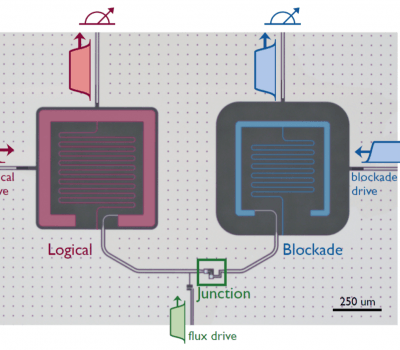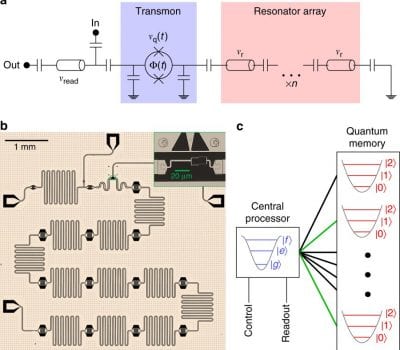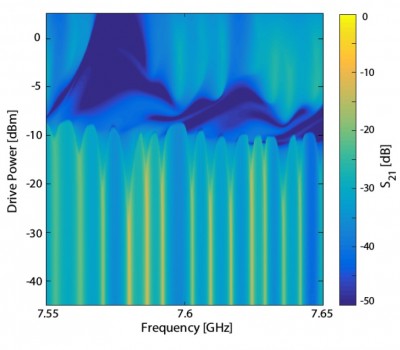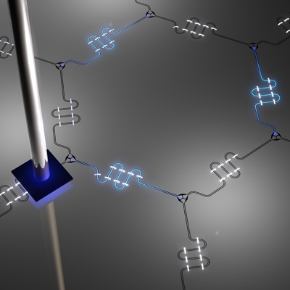In a recent arXiv preprint, we present a gradient-based optimal-control technique for open quantum systems that utilizes quantum trajectories to simulate the quantum dynamics during optimization. Using trajectories allows for optimizing open systems with less computational cost than the regular density matrix approaches in most realistic optimization problems. We introduce an improved-sampling algorithm which minimizes […]
Uncategorized
New PRA publication: Adaptive rotating-wave approximation for driven open quantum systems
In a new PRA paper, We present a numerical method to approximate the long-time asymptotic solution to the Lindblad master equation for an open quantum system under the influence of an external drive. The proposed scheme uses perturbation theory to rank individual drive terms according to their dynamical relevance and adaptively determines an effective Hamiltonian. […]
New preprint: Quantum control of an oscillator using stimulated nonlinearity
In a new arXiv preprint, we collaborate with Andrew A. Houck’s research group at Princeton University on quantum control of an oscillator using stimulated nonlinearity. Superconducting circuits extensively rely on the Josephson junction as a nonlinear electronic element for manipulating quantum information and mediating photon interactions. Despite continuing efforts in designing anharmonic Josephson circuits with […]
New PRA publication: Universal stabilization of single-qubit states using a tunable coupler
In a new PRA paper, we theoretically analyze a scheme for fast stabilization of arbitrary qubit states with high fidelities, extending a protocol recently demonstrated experimentally. Our scheme utilized red and blue sideband transitions in a system composed of a fluxonium qubit, a low-Q LC-oscillator, and a coupler enabling us to tune the interaction between […]
New Nat. Commun. publication: Random access quantum information processors using multimode circuit quantum electrodynamics
Qubit connectivity is an important property of a quantum processor, with an ideal processor having random access—the ability of arbitrary qubit pairs to interact directly. This a challenge with superconducting circuits, as state-of-the-art architectures rely on only nearest-neighbor coupling. Here, we implement a random access superconducting quantum information processor, demonstrating universal operations on a nine-qubit […]
New NJP publication: Mapping repulsive to attractive interaction in driven–dissipative quantum systems
Repulsive and attractive interactions usually lead to very different physics. Striking exceptions exist in the dynamics of driven–dissipative quantum systems. For the example of a photonic Bose–Hubbard dimer, we establish a one-to-one mapping relating cases of onsite repulsion and attraction. We prove that the mapping is valid for an entire class of Markovian open quantum […]
New PRL publication: Universal Stabilization of a Parametrically Coupled Qubit
We autonomously stabilize arbitrary states of a qubit through parametric modulation of the coupling between a fixed frequency qubit and resonator. The coupling modulation is achieved with a tunable coupling design, in which the qubit and the resonator are connected in parallel to a superconducting quantum interference device. This allows for quasistatic tuning of the […]
New PRX publication: Observation of a dissipative phase transition in a cQED lattice
Nonequilibrium phase transitions pose many questions and challenges, in part due to their complexity in theoretical descriptions, in part due to the experimental difficulties in systematically controlling systems out of equilibrium. In work now published in a new PRX article, the Houck Lab has studied a chain of 72 microwave cavities, each coupled to a […]
New preprint: Speedup for quantum optimal control from GPU-based automatic differentiation
In a new preprint, we show how to implement a quantum optimal control algorithm with automatic differentiation executed on a GPU. This work, done in collaboration with the Schuster Lab, highlights how automatic differentiation allows one to specify advanced optimization criteria and incorporate them in the optimization process with ease. We demonstrate that the use […]
Published in PRX and highlighted with a Viewpoint: Paper on Scanning Defect Microscopy
While measurements of global system properties are often readily obtained, measurements of more detailed local properties can provide a deeper understanding of the system at hand on a microscopic level. However, measuring local properties is often difficult. One solution is to use scanning probe measurements in which a probe is dragged across the surface of […]









